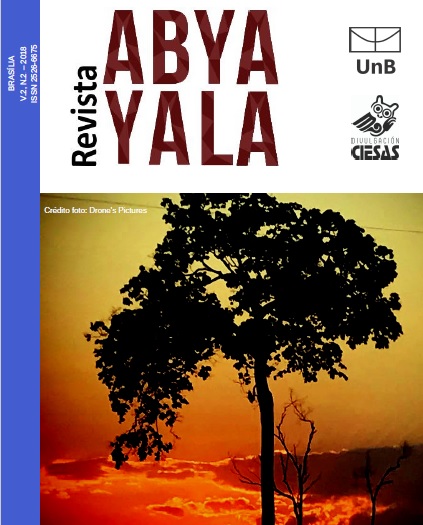OF RUINS AND SERVEDION
ethnographic approaches to haciendas’s memories of the Zongolica, Veracruz
DOI:
https://doi.org/10.26512/abyayala.v2i2.13065Abstract
This article presents initial approaches of an ongoing investigation about the memories of haciendas in the Nahua indigenous region of Zongolica, Veracruz. It investigates how the world of haciendas becomes an emblem of political and racialized hierarchies, as well as of the complex interethnic relations that generate violence and spoils on certain subjects so that they are silenced and accepted. Based on ethnographic records and interviews with a variety of actors, it analyzes the ambiguity in which indigenous memories are woven about the haciendas and the way in which they emerge and are silenced in the current context of violence and territorial dispossession.
Downloads
References
AGUIRRE BELTRÁN, Gonzalo. 1995. Cuatro nobles titulados en contienda por la tierra. México: CIESAS.
CAMBRECY, Luc y Bernal LASCURÁIN.1992. Crónicas de un territorio fraccionado. De la hacienda al ejido (centro de Veracruz). Ciudad de México: Ostrom, Cemca y Larousse.
CASADOS, Estela. 2016. Impunidad e Invisibilización de los feminicidios en Veracruz. Revista Clivajes, 3 (6):58-78.
CERDA GARCÃA, Alejandro. 2012. “El potencial descoloniazador de la Memoria. Elementos para su problematización”. Revista Tramas. 38:. 179-205.
CERVONE, Ema y Cristina CUCURI. 2017. “Indigenous Justice, Gender Inequiality and Intercultural State: The case of Chimborazo, Ecuador”. En SIEDER, Rachel (ed.) Demanding Justice and Security: Indigenous Women and Plural legalities in Latin America, Rutgers University Press- pp. 120-149.
CHENAUT, Victoria. 2014. Género y proceso interlegales. México: CIESAS.
CUMES, Aura. 2014. La india como sirvienta: Servidumbre doméstica colonialismo y patriarcado en Guatemala. Tesis de Doctorado en Antropología. Ciudad de México:CIESAS. .
EARLY, Daniel. 1982. Café: Dependencia y efectos. Comunidades Nahuas de Zongolica, Ver., en el mercado de Nueva York, Instituto Nacional Indigenista, México.
GONZÁLEZ-IZAS, Matilde. 2013. Modernizacion capitalista, racismo y violencia. Guatemala (1250-1930). México: COLMEX.
GORDILLO, Gastón. 2015. “Barcos varados en el monte. Retos del progreso en un río fantasma”. 35(2): 25-55.
HERNÁNDEZ PALESTINO, Daniel. 1991. “Aspectos productivos de dos Ranchos y poder político en Zongolica: Los casos de Tlanecpaquila y Coyametla” Tesis de Licenciatura en Antropología, Xalapa: CIESAS.
JELIN, Elizabeth.2002. Los trabajos de la memoria. Madrid y Buenos Aires: Siglo XXI de España Editores / Siglo XXI de Argentina Editores.
JOSEPH, Gilbert y Daniel NUGENT (eds.).1994. Everyday forms of State Formation: Revolution and the negotiation of Rule in Modern Mexico, Duke University Press.
KATZ, Friedrich. 1991. La servidumbre agraria en México en la época porfiriana. México: Era.
KNIGHT, Alan.2005. “Caciquismo in the Twentieth-century Mexico” en Knight, A. y W. Pansters (eds.) Caciquismo in the Twentieth-century Mexico (pp.3-48). University of London, Londres.
MACIP RÃOS, Ricardo. 2005. Semos un país de peones: Café, crisis y el estado neoliberal en el centro de Veracruz. México: Benemérita Universidad de Puebla.
NAHUELPÁN, Héctor. 2013. “Las ‘Zonas Grises’ de la historia mapuche. Colonialismo internalizado, marginalidad y políticas de la memoria”. Revista de Historia Social y de las Mentalidades, 17 (1):11-33.
NAVARO-YASHIN, Yael. 2009. “Affective spaces, melancholic objects: ruination and the production of anthropological knowledge”. Journal of the Royal Anthropological Institute. 15 (1): 1-18.
NICKEL, Herbert. 1997. El peonaje en las haciendas mexicanas. Interpretaciones, fuentes, hallazgos. México: Universidad Iberoamericana.
RAMOS, Ana M. 2011.Perspectivas antropológicas sobre la memoria en contextos de diversidad y desigualdad. Alteridades-21(42): 115-130.
RODRIGUEZ, Teresa. 1998. “Bibliografía de la Sierra de Zongolica: principales trabajos y temas de investigación antropológica”. Inventario Antropológico- 4: 75-92.
RODRÃGUEZ, Teresa. 2003. Ritual, Identidad y Procesos Étnicos en la Sierra de Zongolica, Veracruz. CIESAS, México.
RUS, Jan. 2003. “Coffee and the Recolonialization Highlands Chiapas, México, 1892-1910”, en Topik y Clarence-Smith (eds.) The World Coffeee Economy, 1500-1940, Cambridge: Cambridge University Press.
RUS, Jan. 2012. El ocaso de las fincas y la transformación de los indígenas de los Altos de Chiapas (1974-2009). Chiapas: Universidad de Ciencias y Artes de Chiapas y Cesmeca.
SIEDER, Rachel (ed.).2016. Demanding Justice and Security: Indigenous Women and Plural legalities in Latin America. New Jersey, Rutgers University Press
SOSME CAMPOS, Miguel. 2015. Tejedoras de Esperanza: Empoderamiento en los grupos artesanales de la Sierra de Zongolica. Ciudad de México: COLMICH.
VELÁZQUEZ, Emilia. 2006. Territorios fragmentados: Estado y Comunidad Indígena en el Istmo Veracruzano. México: CIESAS.
VERDUM, Ricardo.1994. Refletindo sobre memória com Maurice Halbwachs. Ciências Humanas em Revista (História), Goiânia, 5(2): 141-151.
VIVEROS VIGOYA, Mara. 2016. “La interseccionalidad: Una aproximación situada a la dominación”. Debate Feminista. 52: 1-17.
Downloads
Published
How to Cite
Issue
Section
License
Copyright (c) 2018 Abya-Yala: Journal on Access to Justice and Rights in the Americas

This work is licensed under a Creative Commons Attribution-NonCommercial 4.0 International License.
The sending of contributions to Abya Yala implies the assignment of copyright and publication to the Journal, observing the Attribution-Non-Commercial 4.0 International (CC BY-NC 4.0) adopted.
The content of the texts submitted to and published by the journal will be the sole responsibility of their respective authors.
Copyright: https://creativecommons.org/licenses/by-nc/4.0/deed.en





